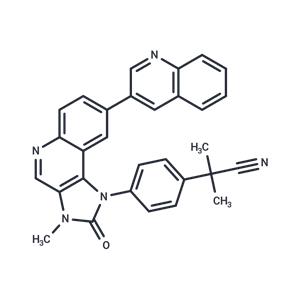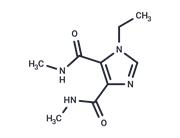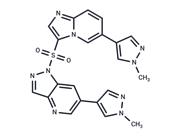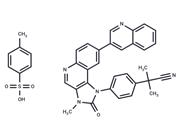| Name | Dactolisib |
| Description | Dactolisib (BEZ235) is an orally bioavailable inhibitor of PI3K and mTOR, with IC50 values of 4 nM for p110α, 5 nM for p110γ, 7 nM for p110δ, 75 nM for p110β, and 20.7 nM for mTOR. |
| Cell Research | The proliferation of BON1, QGP1, and αT3 cells after treatment was measured with the WST-1 colorimetric assay. Cell proliferation in 3D spheroids was measured with the CellTiter-Glo Cell Viability Assay according to the manufacturer's recommendations. Apoptosis was measured by assessing the activity of caspase-3/7 using the Caspase-Glo 3/7 Assay Kit. BON1 cells and QGP1 cells were transfected with scrambled or anti-DEFB1 siRNA as above, and 24 hours later treated with NVP-BEZ235 or DMSO for an additional 24 hours. Caspase-3/7 activity was then assessed with a proluminescent caspase-3/7 substrate, which contains the tetrapeptide sequence DEVD. Luminescence was measured with a luminometer [3]. |
| Kinase Assay | PI3Kα, β, and δ proteins were composed of the iSH2 domain of p85 NH2-terminally fused to the full-length protein p110 protein, with the exception of α that also did not contain the last 20 amino acids. PI3Kγ was produced as full-length protein deleted for its first 144 amino acids. All constructs were fused to a COOH-terminal His tag for convenient purification and then cloned into the pBlue-Bac4.5 (for α, β, and δ isoforms) or pVL1393 (for γ isoform) plasmids. The different vectors were then cotransfected with BaculoGold WT genomic DNA using methods recommended by the vendor for production of the respective recombinant baculoviruses and proteins. Compounds were tested for their activity against PI3K using a Kinase-Glo assay. The kinase reaction was done in 384-well black plate. Each well was loaded with 50 nL of test items (in 90% DMSO) and 5 μL reaction buffer [10 mmol/L Tris-HCl (pH 7.5), 50 mmol/L NaCl, 3 mmol/L MgCl2, 1 mmol/L DTT, and 0.05% CHAPS] containing 10 μg/mL PI substrate (l-α-phosphatidylinositol; Avanti Polar Lipids; prepared in 3% octyl-glucoside) and the PI3K proteins (10, 25, 10, and 150 nmol/L of p110α, p110β, p110δ, and p110γ, respectively) were then added. The reaction was started by the addition of 5 μL of 1 μmol/L ATP prepared in the reaction buffer and ran for either 60 (for p110α, p110β, and p110δ) or 120 min (for p110γ) and subsequently terminated by the addition of 10 μL Kinase-Glo buffer. The plates were then read in a Synergy 2 reader for luminescence detection [1]. |
| Animal Research | Three doses of NVP-BEZ235 were tested in MENX rats: 20, 30, and 45 mg/kg. As the two higher doses caused a weight loss >10% after 10 days of treatment, the dose of 20 mg/kg was used for further studies. For MRI studies, MENX-affected rats at 7 to 8 months of age (with sizeable adenomas but still in good general health) were treated for 14 days with NVP-BEZ235 (20 mg/kg) or placebo (PEG) administered daily per oral gavage. The side effect of the drug we observed was mild diarrhea in the last days of the treatment (4/8 rats). Being this our first in vivo study of spontaneous rat pituitary adenomas, functional/molecular changes in the tumors were considered more objective and measurable endpoints (primary endpoints) compared to the size and/or survival (secondary endpoints) [3]. |
| In vitro | Dactolisib (BEZ235) shows slightly lower activity against the β paralogue (IC50: 75 nmol/L). NVP-BEZ235 (250 nmol/L) was able to reduce IGF-I-induced S473P-Akt levels below the limit of detection, whereas the phosphorylation of the p85 binding site on IGF-IR (Y1316) was not altered [1]. BEZ235 provoked a more profound effect with an IC50 value of 1.8 nmol/L and cytostasis was obtained at 10 nmol/L. Moreover, at a concentration of 100 nmol/L, the BrdUrd uptake was less than the one observed in starved, VEGF-untreated cells, indicative of cell death induction [2]. |
| In vivo | In the absence of inhibitors, the weight of the chamber, as well as levels of the endothelial cell marker Tie-2, were significantly increased in the presence of VEGF. Both effects were significantly inhibited in a dose-dependent manner when the mice were treated with NVP-BEZ235 given p.o. twice a day at 20 mg/kg or once at 30 mg/kg, showing the specificity of the angiogenic response driven by the VEGF [2]. NVP-BEZ235–treated adenomas (20 mg/kg) showed pronounced vacuolation of the cytoplasm when compared with PEG-treated animals. Vacuoles appeared even more prominent at the 30 and 45 mg/kg doses [3]. |
| Storage | In solvent: -80°C for 1 year | Shipping with blue ice/Shipping at ambient temperature. |
| Solubility Information | DMSO : 1 mg/mL (2.13 mM), Sonication is recommended.
H2O : < 0.1 mg/mL (insoluble)
|
| Keywords | PI3K | Phosphoinositide 3-kinase | p110δ | p110γ | p110α | NVP-BEZ-235 | NVP-BEZ 235 | mTOR (p70S6K) | mTOR | Mammalian target of Rapamycin | Inhibitor | inhibit | Dactolisib | BEZ-235 | BEZ 235 | Autophagy | ATR | ATM |
| Inhibitors Related | Stavudine | Aceglutamide | Hemin | Tamoxifen | Cysteamine hydrochloride | Sodium 4-phenylbutyrate | Hyaluronic acid | Hydroxychloroquine | Guanidine hydrochloride | Paeonol | Naringin | Alginic acid |
| Related Compound Libraries | Failed Clinical Trials Compound Library | Bioactive Compound Library | Kinase Inhibitor Library | Anti-Cancer Clinical Compound Library | Drug Repurposing Compound Library | Anti-Viral Compound Library | Inhibitor Library | Immunology/Inflammation Compound Library | Anti-Aging Compound Library | Bioactive Compounds Library Max | Anti-Cancer Active Compound Library | Anti-Cancer Drug Library |

 United States
United States






